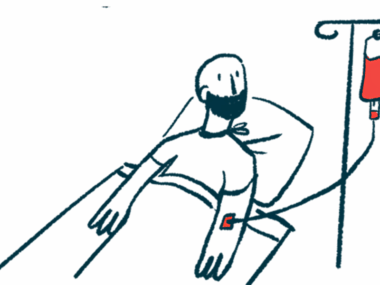#AAN2022 – Clinical Benefits of Ultomiris Sustained for Over a Year
Written by |

Treatment with Ultomiris (ravulizumab-cwvz) eased symptoms of generalized myasthenia gravis (gMG) for more than a year, according to new data from the ongoing CHAMPION-MG extension study.
Findings were shared at the 2022 American Academy of Neurology (AAN) Annual Meeting in an oral presentation, titled “Long-term Efficacy and Safety of Ravulizumab, a Long-acting Terminal Complement Inhibitor, in Adults with Anti-Acetylcholine Receptor Antibody-Positive Generalized Myasthenia Gravis: Results from the Phase 3 CHAMPION MG Open-label Extension.”
Ultomiris is an antibody-based therapy developed by Alexion Pharmaceuticals, now part of AstraZeneca, that is currently under priority review by the U.S. Food and Drug Administration as a potential treatment for adults with gMG.
The medication, delivered via infusion into the bloodstream, works by blocking the activation of the complement cascade, a part of the immune system that is thought to drive gMG.
The safety and effectiveness of Ultimiris in adults with gMG is being studied in an Alexion-sponsored Phase 3 trial called CHAMPION-MG (NCT03920293). Data from this trial served as the basis for the application seeking the approval of Ultomiris in the U.S.
For the first 26 weeks (roughly six months) of the trial, participants were given Ultomiris or a placebo. After that, nearly all participants chose to enter an open-label extension (OLE) portion of the study, where all were treated with Ultomiris.
At the AAN meeting, scientists at Alexion and other institutions shared data from 79 trial participants who had been in the OLE for at least 26 weeks. Of these patients, 38 had received Ultomiris in the first 26 weeks of the trial, while the other 41 had been given a placebo.
Results from the first 26 weeks of the study showed that participants treated with Ultomiris showed a significant decrease (improvement), by 3.1 points on average, in scores on the Myasthenia Gravis Activities of Daily Living (MG-ADL), a patient-reported assessment of symptom severity.
After another 26 weeks in the extension study — about a year on Ultomiris in total — these improvements were sustained, with the average MG-ADL score being 4.0 points lower than a year earlier. Other measures, including the Quantitative Myasthenia Gravis Total Score and the Neurological Quality of Life Fatigue Subscale Score, also showed significant improvements after 60 weeks on Ultomiris.
“These results reinforce that [complement] inhibition with predictable dosing is an important treatment option which provides sustained improvement of functional activities,” James Howard, Jr, MD, a professor at The University of North Carolina School of Medicine and lead investigator for the CHAMPION-MG trial, said in a press release.
For the participants who switched from placebo to Ultomiris upon entering the OLE, Ultomiris significantly eased symptoms over 26 weeks, with MG-ADL scores dropping by 2.4 points on average. The improvements seen were generally comparable to what was previously reported in the participants who had been given the medication at the start of the trial.
“These data are encouraging because they suggest Ultomiris has the potential to help a broader range of gMG patients, including those with milder symptoms, regain control of their lives and experience sustained clinical benefit through 60 weeks,” said Gianluca Pirozzi, MD, PhD, senior vice president, head of development and safety at Alexion.
Ultomiris’ safety and tolerability in the extension portion of the study was generally consistent with those seen in the randomized portion of the trial. The most common side effects seen in patients given Ultomiris during CHAMPION-MG were headache and nausea. No cases of meningococcal infection were reported.
Note: The Myasthenia Gravis News team is providing coverage of the American Academy of Neurology 2022 Annual Meeting.





Leave a comment
Fill in the required fields to post. Your email address will not be published.